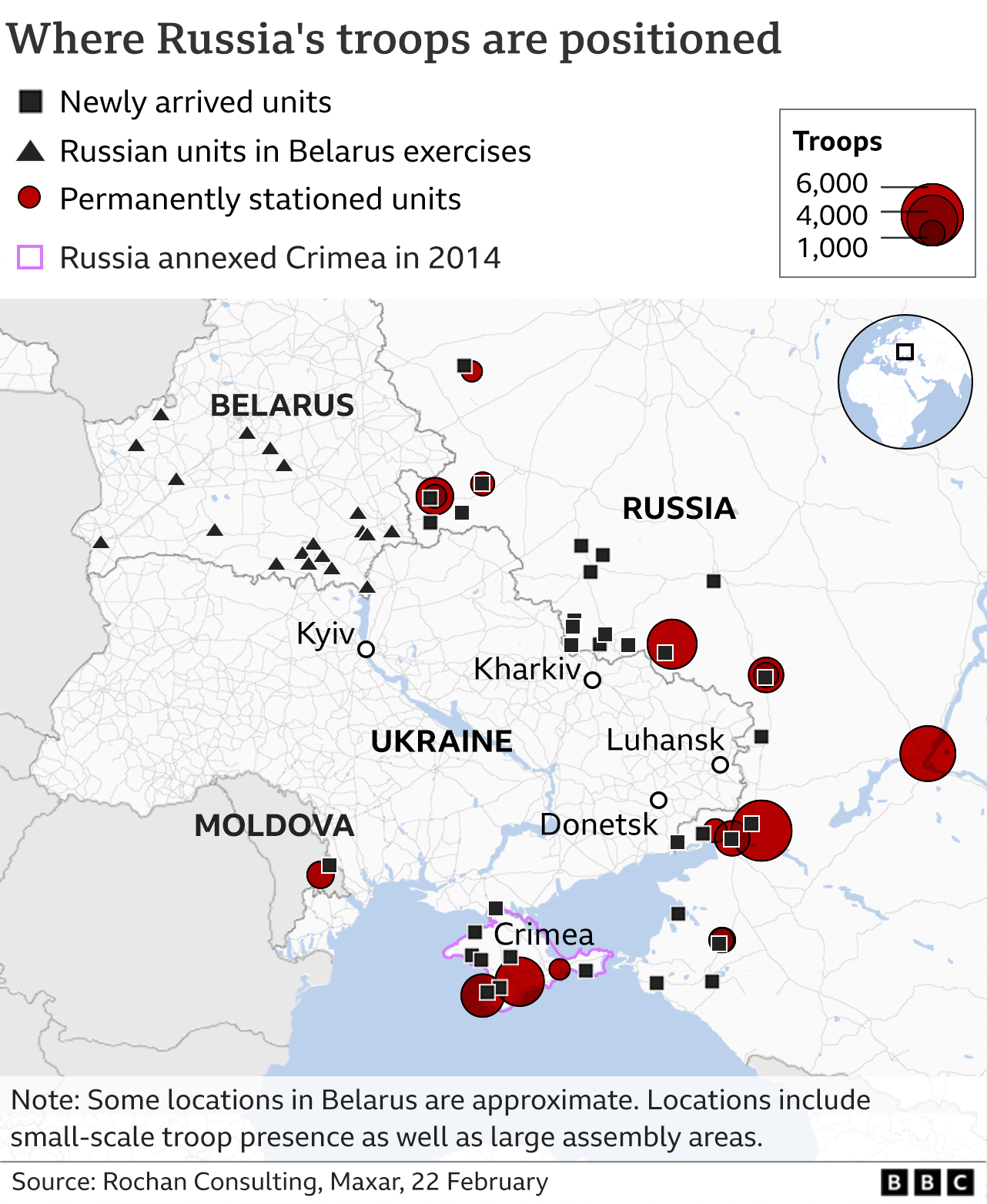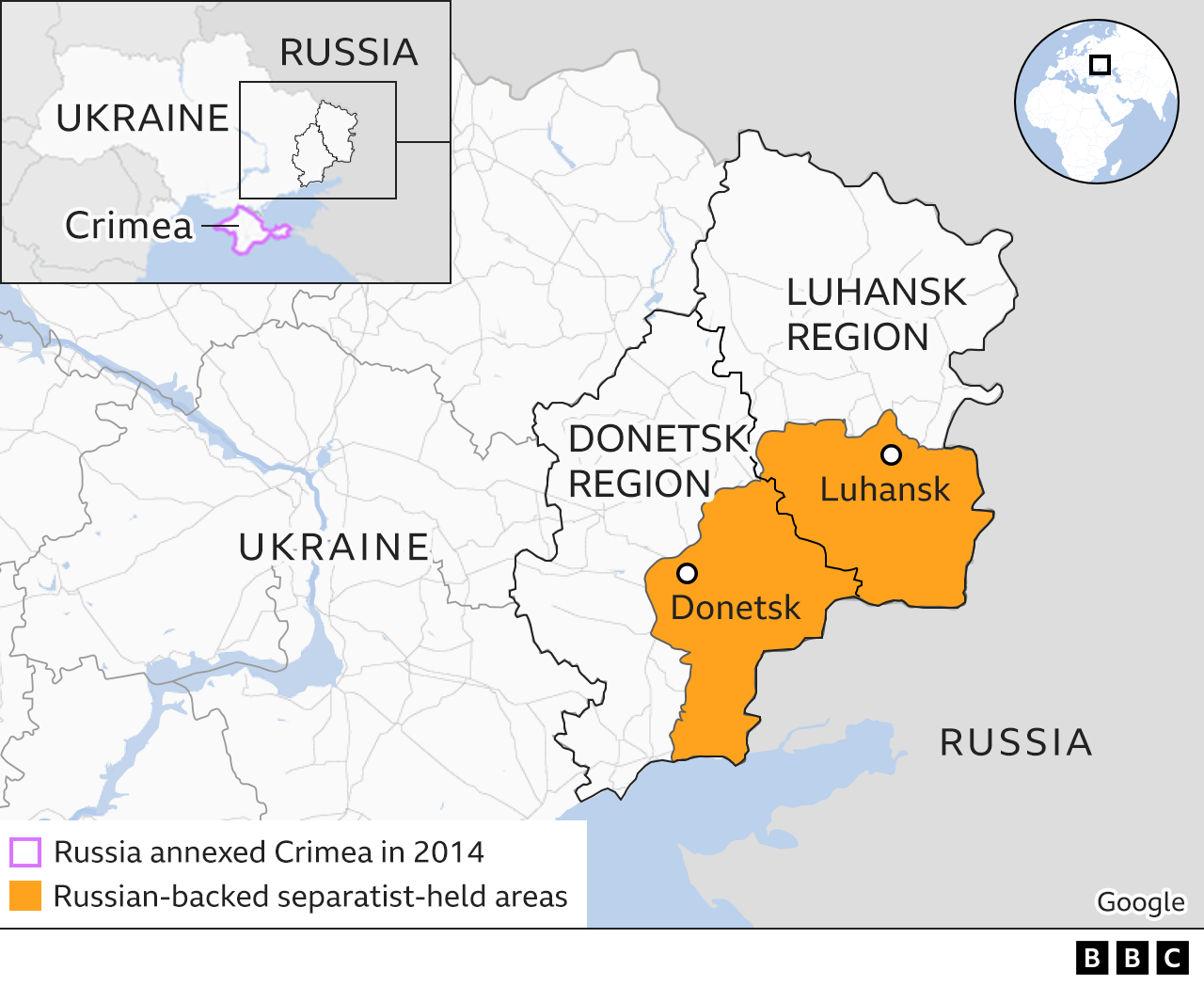Why is Russia ordering troops into Ukraine and what does Putin want?
For months Russia's Vladimir Putin denied planning to attack Ukraine, but he has now torn up a peace deal and ordered troops into two rebel-held eastern regions, in his words to "maintain peace".
Russia has deployed at least 150,000 troops near Ukraine's borders in recent months, and there are fears that its latest move marks the first step in a new invasion. What happens next could jeopardise Europe's entire security structure.
Where are Russian troops being sent and why?
When Russia invaded Ukraine in 2014, rebels backed by President Putin seized big swathes of the east and they have fought Ukraine's army ever since. There was an international Minsk peace accord but the conflict continues and so Russia's leader says he is sending in so-called peacekeepers into two rebel-held areas.
The West sees that as nonsense and believes Moscow is planning an imminent, new invasion of Ukraine, a country of 44 million people bordering both Russia and the European Union. For a start, there are reports of tanks arriving in separatist-controlled Donetsk and the latest satellite photos show Russian troops deployed within 9 to 19 miles (15-30km) of Ukraine's borders.


President Putin warned Ukraine it would be responsible for further bloodshed if it did not halt hostilities in the east. But there have already been a series of bogus incidents and any one of them could be used as a pretext for a Russian attack.
What's Putin's problem with Ukraine?
Russia has long resisted Ukraine's move towards European institutions, both Nato and the EU. Now, Mr Putin has claimed Ukraine is a puppet of the West and was never a proper state anyway.
His core demand is that the West guarantee Ukraine will not join Nato, a defensive alliance of 30 countries.
As a former Soviet republic Ukraine has deep social and cultural ties with Russia, and Russian is widely spoken there, but ever since Russia invaded in 2014 those relations have frayed.
Russia attacked Ukraine when its pro-Russian president was deposed in early 2014. The war in the east has since claimed more than 14,000 lives.


Why is recognition of rebel areas dangerous?
Until now these so-called people's republics of Donetsk and Luhansk have been run by Russian proxies.
Under Mr Putin's decree recognising them as independent, Russian troops are for the first time recognised as stationed there and they can build military bases too. Russian officials have also revealed they believe the republics should include areas later recaptured by Ukrainian forces.
So, by pouring Russian troops into an area witnessing hundreds of ceasefire violations every day, the risk of open war becomes far higher. The two rebel areas would have had special status within Ukraine under the Minsk peace accords, but Mr Putin's move bars that from happening.
Russia has already prepared the ground for war, with false accusations that Ukraine committed "genocide" in the east. It has handed out more than 700,000 passports in rebel-run areas, so any action could be justified as protecting its own citizens.
How far will Russia go?
President Putin may stop at tearing up the peace accords in the east. He has in the past only spoken of "military-technical" measures if he does not get what he wants and Moscow previously insisted "there is no Russian invasion".
But the chances of a diplomatic solution do not look good and the West fears he will go further. US President Joe Biden has warned: "We believe they will target Ukraine's capital Kyiv, a city of 2.8 million innocent people."
In theory, Russian forces could aim to sweep across Ukraine from the east, north and south and try to remove its democratically elected government. They could mobilise troops in Crimea, Belarus and around Ukraine's eastern borders.



No comments